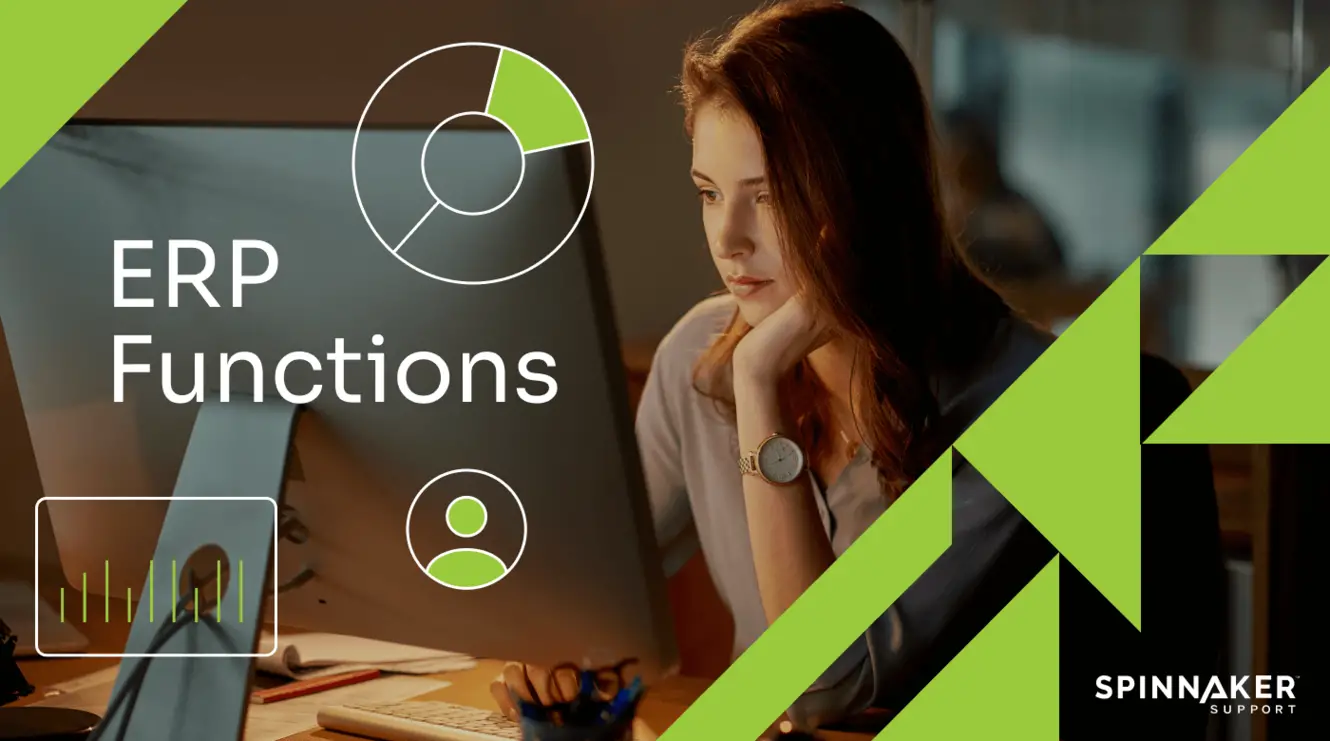
With Enterprise Resource Planning (ERP) software, a business can consolidate all its data and processes into one place. This creates a “single source of truth” where employees can manage (and even automate) every aspect of the business.
Yet, despite the benefits of ERP software, there are drawbacks. It can be challenging to learn all the core ERP functions and optimize them into the most efficient configuration for your unique business needs.
In this article, you will learn what ERP software is, its benefits, core functions, and how Spinnaker Support can help integrate ERP software into your business.
What is enterprise resource planning (ERP) software?
An ERP software system is an integrated platform that consolidates all business data and processes into one place. The most common processes businesses optimize with ERP software are customer service, sales and marketing, Human Resources (HR), finance, supply chain management, and project management.
Businesses also use ERP Artificial Intelligence (AI) and Machine Learning (ML) capabilities to automate repetitive manual tasks and to identify trends, predict outcomes, and anticipate upcoming demand.
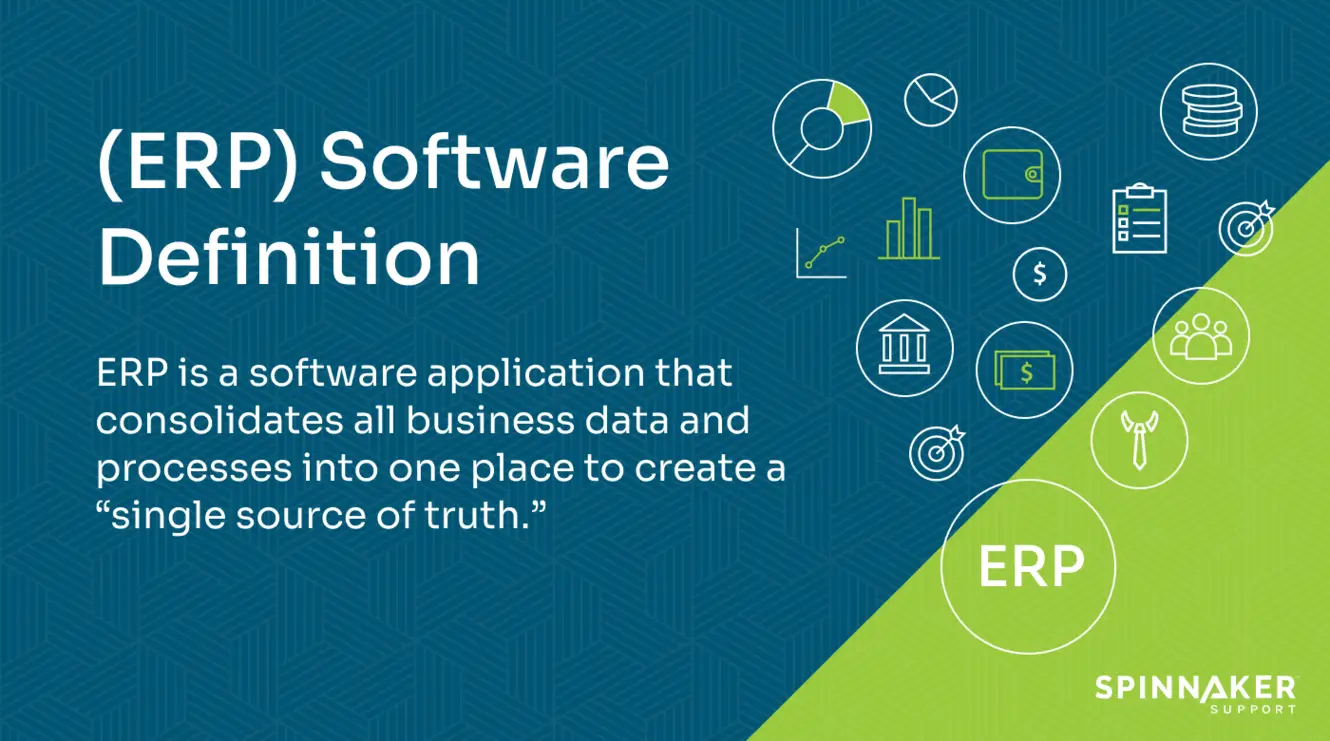
Onsite and cloud deployment
ERP software is available in on-premises and cloud versions. These days, most companies deploy their ERP software in the cloud.
With a cloud arrangement, a business pays a monthly or annual subscription fee to a software vendor. In exchange, the vendor will host and maintain the ERP system. This deployment model is known as the Software-as-a-Service (SaaS) model and is the most common deployment model in the ERP sector.
Most ERP vendors, such as Amazon Web Services and Microsoft Azure, host their ERP software in a public cloud. This means the software vendor shares their ERP software with multiple users at once, but each user’s business data and processes are hidden from one another.
Businesses can also deploy ERP software in a private cloud, but they are responsible for maintaining that environment, as they are the only users present.
What are the advantages of ERP software?
ERP software has the potential to streamline various business activities. The key is to set up and configure the software properly to achieve the desired outcomes.
When you work with a third-party support and managed services provider, such as Spinnaker Support, you can fine-tune your ERP system to meet your unique requirements.
Here are four reasons to incorporate ERP software into your business.
Increased productivity
ERP software enables employees, vendors, and customers to easily access the data and processes they need. This is especially true for cloud ERP software, where users need only a web browser to gain access. No local installation is required.
In addition, ERP software helps employees working across multiple departments share vital information seamlessly and effortlessly, speeding up customer query and emergency response times. Businesses can also use automation to streamline previously manual tasks, freeing time for employees to focus on more meaningful activities.
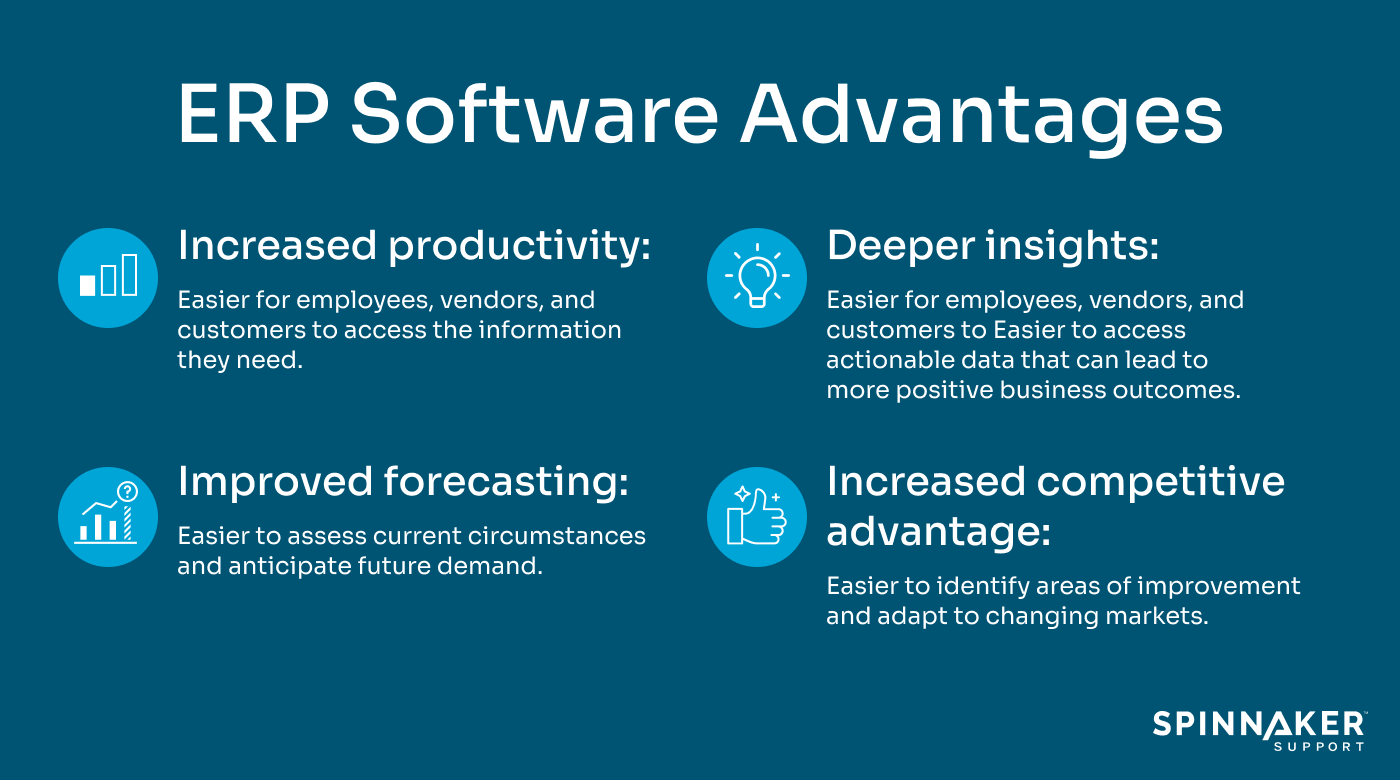
Improved forecasting
By gathering big data from multiple sources and using AI and ML to evaluate past activity, businesses can identify trends to anticipate (potential) future demand.
Manufacturing plants, for instance, can evaluate data from past peak periods. They can then use this data to determine what materials, labor, and equipment they need for similar events. Manufacturers can also prioritize predictive maintenance and repairing essential equipment to manage higher workloads.
Finance departments can also use ERP software to gain insight into future cash flow. They can then adjust spending to ensure the business can finance all upcoming activities.
Deeper insights
Deeper insights help businesses learn more about its customers, processes, and achievable outcomes. Sales and marketing experts can use ERP to create unique customer profiles.
Customer profiles outline their unique traits, like their interests, favorite products, wish-listed items (products they may purchase later), and purchase history. With this data, marketing experts can personalize the customer sales journey, delivering only timely and relevant marketing material to that customer.
Increased competitive advantage
Outdated infrastructure can hold a business back from reaching its full potential. For example, legacy systems often consist of un-integrated individual pieces of software for multiple aspects of the business, which leads to informational blind spots and wasted time searching for the right information at the right time. Companies waste time maintaining old infrastructure instead of investing in something better.
When a business lets go of its outdated legacy infrastructure it can take advantage of new efficiencies through a unified, automated platform. This increase in efficiency of business operations ultimately helps both profitability and customer satisfaction.
5 essential ERP functions
Businesses can use ERP software to streamline a wide variety of processes, with the five most common being finance, customer relationship management, sales and marketing, human resources, and supply chain management.
But there is no one size fits all approach. Your best results will come from finding the custom solution that is right for your unique needs.
Through SpectrumAMS, Spinnaker Support can evaluate your existing technical stack and business objectives. Your team can then recommend ERP capabilities that best fit your business. They can even help you choose the right vendors, whether Microsoft Dynamics 365, Oracle, or other providers.
Here are five ways that ERP software can help streamline your business.
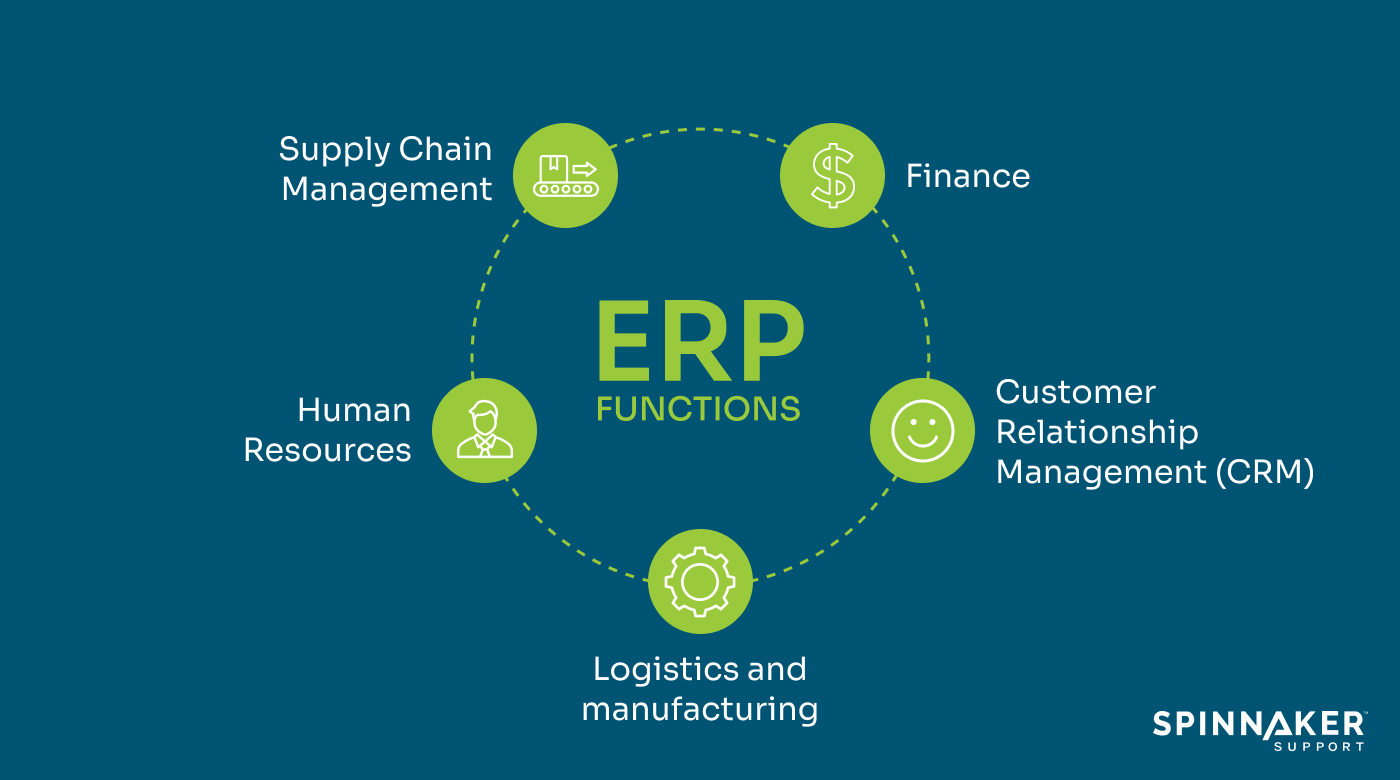
Finance
The financial management module is one of the most important modules in an ERP system. It enables the finance department to automate a wide range of tasks. These include tasks related to payables and receivables, invoicing, budget forecasting, assets and liabilities, cash flow management, and more.
The finance module also helps the finance department gather relevant information from other departments. For example, they can import data from HR, such as employee profiles, which they can then use to ensure that employees are being paid the correct amount. They can also import data from the supply chain module, ensuring the business has the finances to pay for labor, materials, and equipment maintenance.
Finance teams can also use ERP software to ensure compliance, preparing the business for audits and tax submissions.
Customer relationship management (CRM)
The CRM module makes it easier for a business to learn about and understand its customers. This is not just basic information, such as their personal interests and purchase history, but also deeper insights – like their level of satisfaction with your customer service team, favorite products and services, preconceived notions about your industry, and loyalty to your brand.
The CRM department can create and deploy personalized customer satisfaction surveys with ERP software. They can then review the results and use those insights to make informed decisions. For example, suppose a customer had a recent poor customer service experience. In that case, the business can raise the issue with the customer service team and offer tips on preventing the same issue from happening again.
The CRM department can also share relevant customer data with sales and marketing. This way, the sales team can personalize the customer journey, saying and doing the right things when interacting with customers.
Sales and marketing
An ERP software system can help the sales and marketing department achieve many goals. They include features to help the team nurture leads, personalize the sales journey, and convert prospects into paying customers.
By creating unique customer profiles, the sales and marketing team can determine, with utmost accuracy, what selling points a customer is likely to respond well to. They can then use this data to craft follow-up emails, direct messages, and Google-powered advertisements. This way, the sales and marketing team is more likely to communicate how they would like to be spoken to with customers on their level.
Also, businesses can use ERP software to monitor sales performance. For example, the number of deals that individual salespeople have won. The sales operations team can use this data to determine the top performers and help the rest learn from the best.

Human resources
Employee satisfaction can be just as important as customer satisfaction. Hence, you should have a solid onboarding and training program for your employees. This way, they will likely gel with your business and stick with you long-term. ERP software makes it easy for your business to onboard new employees and integrate them with your daily operations.
New employees can create profiles using the self-service portal and update their details when necessary. They also receive all the onboarding material they need to get up to speed with their role, your business, and your unique company culture. The human resource management department can also share employee data with payroll and finance, saving them time and money on manually creating separate employee profiles.
Supply chain management
Using an ERP software solution, a business can oversee every step of the supply chain: evaluating labor demand, sourcing materials, manufacturing products, and distributing those products to the right locations at the right time.
Through a single dashboard, supply chain managers can interact with different supply chain modules at once. They can use AI to predict future demand for labor, materials, and equipment; monitor readings from Internet of Things (IoT) sensors; perform inventory management to prevent under- and over-stocking; and communicate with vendors (and compare their prices) through the vendor portal.
How Spinnaker Support can integrate ERP capabilities into your business
Do you need help with setting up a new ERP system? Optimizing your existing one? Or migrating from a legacy to a cloud infrastructure?
At Spinnaker Support, you will receive the guidance you need to get the most out of your enterprise resource planning system. Your dedicated engineers — who will either augment your existing IT team or assume full control of your IT environment — will help you deploy new ERP software, optimize your existing software, deploy minor enhancements, and respond proactively to performance and cybersecurity concerns.
Here are four other solutions that Spinnaker Support can provide for you:
Evaluate your existing technical stack
Your IT environment is unique. So, whatever solution you receive from us should be tailored to your unique needs. The Spinnaker Support team will evaluate your IT environment to achieve this. This involves a comprehensive review of your existing onsite, cloud, and hybrid applications and your existing data and business processes.
This information will help your engineers determine what solution is right for you. The team will gain a deeper understanding of your business, including your target customers, the products and services you provide, the volume of activity, and your peak operational periods. The team can then devote the time and resources to achieving your unique goals.

Migrate ERP systems
Do you need data to migrate from the original source to an ERP database? Spinnaker Support can help.
Your engineers can gather your legacy data — from various systems, formats, and storage types — and give it a universal structure, transforming it into a format compatible with the ERP database. By following best practices for ERP migration, the team will perform the migration while maintaining business continuity and minimizing downtime.
Fine-tune and optimize
Spinnaker Support can also fine-tune and optimize your existing ERP software. The team will help identify and address underperformance, cybersecurity vulnerabilities, and non-compliance.
The optimization process may involve deleting or archiving old data, merging (currently) disparate systems, and prioritizing software maintenance. Either way, the team will take the necessary steps to identify problems, recommend the right upgrade paths, and simplify your data and processes.
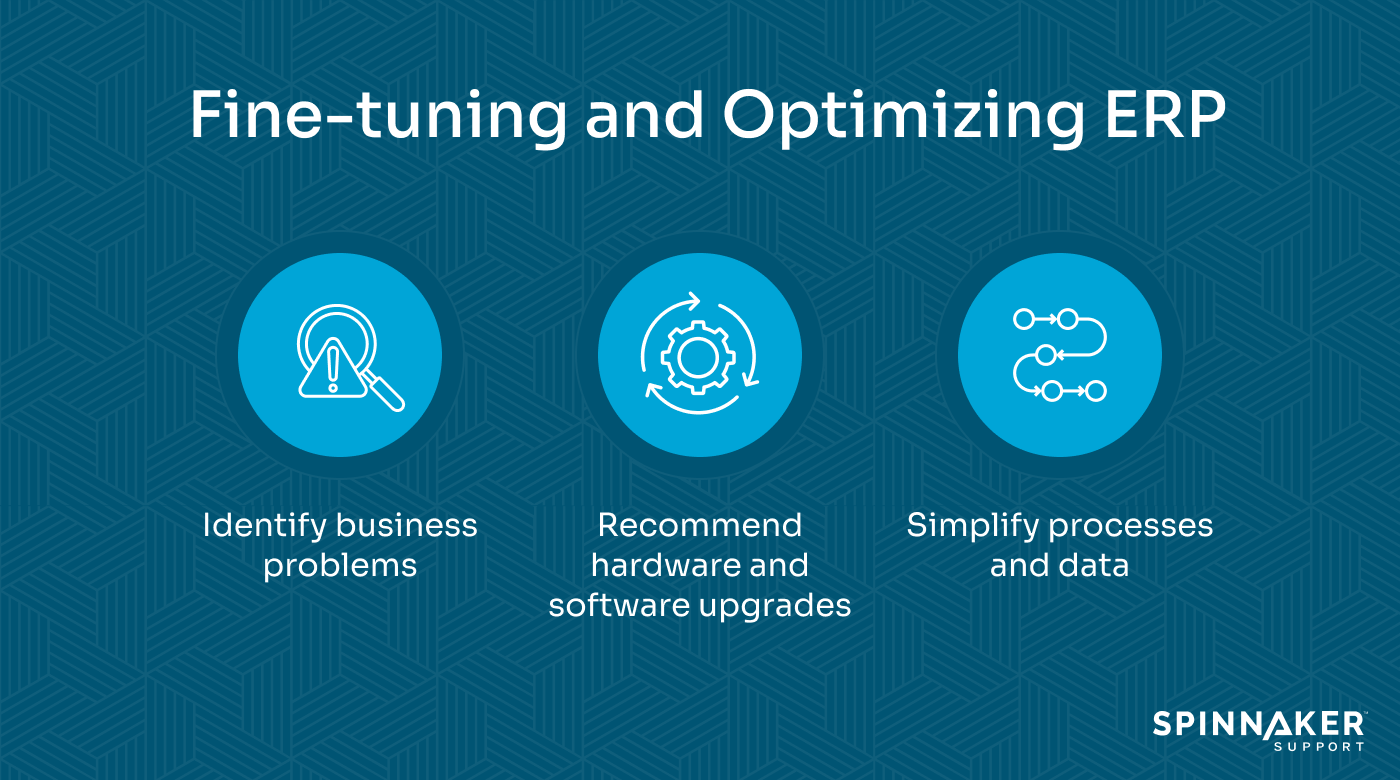
Monitor and maintain
Ongoing maintenance from Spinnaker Support will give you the confidence that your ERP system is always available, secure, and up to date.
Your engineers will proactively monitor every aspect of your ERP system, including the performance, cybersecurity, and compliance benchmarks. They will notify you of potential issues — before they escalate into catastrophic problems — and use a triage system, prioritizing the most potentially damaging issues over minor ones.
Be ERP capable with Spinnaker Support
ERP software is a powerful and effective way to streamline every aspect of your business. However, making sense of all the possible functions (and using them correctly) can make choosing the right ERP software tricky.
By approaching Spinnaker Support, we can help you choose the right ERP software and integrate it seamlessly into your cloud, hybrid, or onsite environment. We can also fine-tune and optimize your ERP software to ensure you get the most value from your investment.
Contact us for more information about our ERP services.


